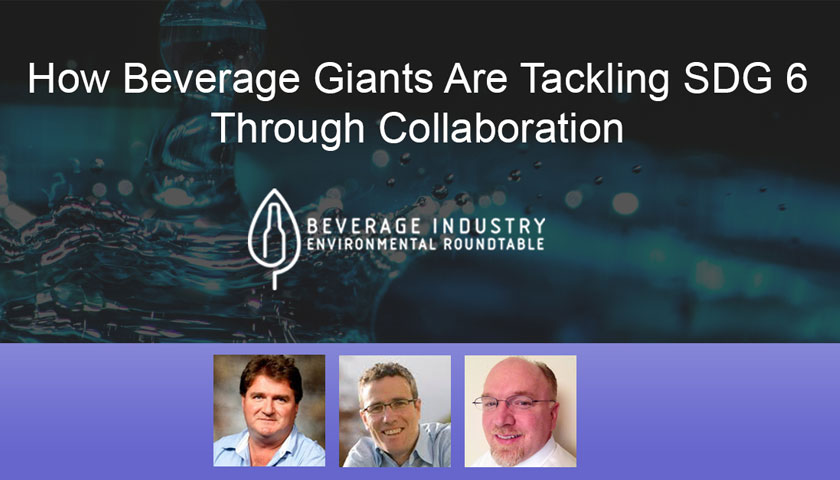ABInBev. American Beverage Association. Bacardi. Beam Suntory. Brown-Forman. Carlsberg Group. Constellation Brands. Diageo. HEINEKEN. Keurig Dr. Pepper. Molson Coors and MillerCoors. Ocean Spray. PepsiCo. Pernod Ricard. The Coca-Cola Company.
These 16 companies are industry giants, delivering nearly every corner of the world with thirst-quenching drinkables of every variety. On the streets, these companies are competing for consumer affections and loyalty. But behind the scenes, they’re tackling one of our world’s most pressing challenges: water.
“Across the world, hundreds of millions of people lack access to safe, clean water—not to mention the fact that demand for water is growing with climate and security threats increasing,” Andre Fourie, Global Director of Water Sustainability at ABInBev, said. “As some of the world’s most recognized and beloved brands—and brands that rely on good quality water to make great beers-—it’s our duty to rise as leaders in advancing water security for all.”
Today, each of these brands has publicly declared their commitment to achieving the United Nation’s aggressive Sustainable Development Goal (SDG) 6, which centers on ensuring the availability and sustainable management of water and sanitation worldwide by 2030.
But commitment and action aren’t one in the same. These companies have not only committed but are making incredible progress toward their goals—both individually and together. How? Read on to learn more.
A New Era Rises
Addressing global water issues has been top of mind for beverage companies for some time; they’ve been growing in sustainability maturity for decades. But their dedication grew to new heights in 2006 when several of these companies set competition aside and founded the Beverage Industry Environmental Roundtable (BIER).
“Water is our most important ingredient but is also a precious shared resource which is coming under increasing pressure in many parts of the world.” Michael Alexander, Global Head of Water, Environment, and Agriculture Sustainability for Diageo, stated. “We know we cannot address these complex issues on our own; collaboration is absolutely essential to make a meaningful impact.”
From water benchmarking to crafting an iterative water stewardship framework, BIER members have collaborated on numerous initiatives, each aimed at advancing sustainability within the beverage sector. In 2015, when SDGs were officially adopted by the United Nations, BIER’s water, energy, and climate change workstreams became focused supporting those goals.
Walking the Water Walk
Water is undoubtedly the lifeblood of the beverage business. As Michael stated, protecting this shared resource is not only the right thing to do, it’s a business imperative. And this isn’t just talk—these companies are taking action and making real progress toward their SDG goals.
For starters, BIER member companies have a combined 20% improvement in water use efficiency since 2009. But water conservation is just one water security ingredient.
“Every BIER member knows that in order to make meaningful change and reach our SDG goals, we need to look beyond the four walls of our organizations,” Rick Price, Director of Global Environment, Health and Safety at Beam Suntory, said. “We need to understand the challenges and opportunities facing the local watersheds and communities in which we operate.”
What does that look like in action? Each company has developed its own SDG 6 roadmap and checkpoints through 2030. Here are just a few examples of progress to sip on:
- Beam Suntory, which joined BIER shortly after our 2006 inception, has invested $60 million to reduce environmental impacts since 2008. The company has also established two natural water sanctuaries in North America and provided 5,000 people in India with permanent access to safe drinking water.
- The Coca-Cola Company, a founding BIER member, safely returned 155% of water used in their finished products to communities and nature in 2018.
- PepsiCo, also a founding member, launched a new conservation and agroforestry initiative in 2018 aimed at improving water security in the Santo Domingo region of the Dominican Republic.
- HEINEKEN has cut water consumption in its breweries by 29% since 2008 and 96.5% of their wastewater is now treated before discharge.
Andre, who co-leads BIER’s Water Working Group, added that innovation in both thinking and technology is key to making progress.
“Many of us are actively pursuing basin-level partnerships to enhance watershed protection, data collection, community collaboration, and bring insights back to the BIER table and to interested stakeholders,” he said. “In addition, we’re researching and evaluating new methods and technologies to transform our water security efforts. AB InBev has actively invested in the 100+ Accelerator to promote innovation and stimulate the creative energy of startup firms on improving the water situation.”
Water reclaim and reuse is one opportunity that is particularly top of mind and has been a focus for BIER’s recently formed Technology Working Group.
“At the recent BIER meeting, two suppliers demonstrated some recent innovations in water recovery technologies,” Michael shared. “One example from Singapore effectively demonstrated what’s possible with advances in water recovery and reuse facilities operating at a significantly reduced footprint, ~75% less, using these new and emerging technologies.”
We’re Just Getting Started
For decades, beverage companies have been increasing their commitments to enhancing water stewardship and security inside and outside their facilities. Today, more than a dozen leading companies come together in the spirit of collaboration to not only make their individual efforts more powerful, but also advance sustainability within the industry (and the world).
“Global water access, sanitation, and security are perhaps the greatest sustainability challenges our world faces,” Rick said. “These issues are directly tied to many of the political, social, economic, and climate-related issues impacting our societies.”
He added: “We’re making incredible progress. We’re doing it together. And we’re just getting started.”
